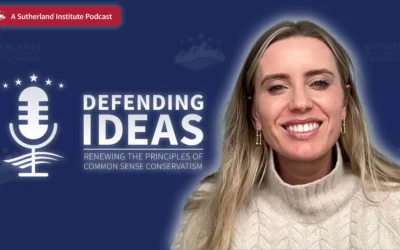
Written by Derek Monson
May 24, 2021
What a difference a few days (and cooler heads) can make.
Utah lawmakers rightly and properly detailed their concerns – in companion House and Senate resolutions – about specific critical race theory concepts being included in curriculum standards and teacher training.
Utah had been barreling toward a divisive and polarizing legislative proposal regarding critical race theory in K-12 public schools. It would have been passed with little public input or policymaker vetting in a special legislative session – politicizing and bringing the divisiveness of politics into our students’ classrooms in the process.
Now, the state school board is contemplating its position and potential action on the matter in light of the legislative resolutions, and a legislative committee has committed to studying the issue in-depth and likely revisiting it during the next legislative session in 2022.
Both Gov. Spencer Cox and Utah legislators should be commended for the actions that led to this renewed policymaking process. Cox wisely decided not to include a ban on critical race theory in K-12 schools on the special session agenda. Utah legislators, while voicing some understandable frustrations, prudently responded and did the public a service by moving forward resolutions that help inform the public about where the greatest concerns lie regarding critical race theory.
Utah is now positioned to move forward a policymaking process designed to produce better public policy and a more informed (rather than misinformed) public. The state school board’s decision on how concerns over critical race theory concepts ought to be addressed will set the stage for legislators’ study of the issue and proper oversight of the board’s actions. As a result, there will be time for the public to learn more about critical race theory and the concerns about it, and any resulting legislation will likely be more thoughtfully crafted, more effective, and more reflective of the will of the people.
In other words, Utah is positioned to successfully address this complex and controversial issue, just as it has positioned itself to succeed in many other areas – economically and fiscally, for example – over the years. Much work and many potential pitfalls still remain, however.
The party-line votes on both House and Senate critical race theory resolutions suggest that more effort can be made to cross political and ideological divides in our pursuit of a genuine solution. Of course, that will require representatives from all sides to approach the issue with fair-mindedness and in good faith.
But Utah has a long track record of working across partisan divides to find solutions to controversial issues – solutions that have eluded other states. Utah’s approach to LGBTQ+ rights in housing, employment and religious freedom is one high-profile example. We have done it before on thorny issues – taking some rhetorical arrows for our efforts – and we can do it again.
There is also the ever-present temptation to succumb to activist attempts – on both sides – to polarize and divide in ways designed to prevent consensus-building and genuine policy solutions. Washington, D.C., has proven incapable – some might argue incompetent – of honestly facing and overcoming the reality of this challenge. Utah is not immune to this problem just because we are Utah. We will only continue to rise above politics as usual if we commit to it and have the courage to see that commitment through.
But because we as a people – policymakers and the public alike – share desired outcomes, we can be optimistic in our ability to create good policy around controversial issues like critical race theory. We all want to overcome racial divides, avoid politicizing the classroom, and ensure that students have the critical thinking and learning skills to allow them to come to their own informed conclusions. If we keep those shared outcomes foremost in our debate and our policymaking processes, we can reach consensus despite disagreements on how to reach those outcomes.
As this week turns into next, and we begin the hard work of crafting genuine policy solutions on tricky education issues, we should be both grateful for what has happened thus far and cognizant that difficult decisions remain. But we have the basic civic ingredients in place to get this right. It remains up to us to do so.
More Insights
Read More
Why is Utah at odds with Justice Department over treatment of gender-dysphoric prisoner?
Lawsuit illustrates a little-known practice of federal agencies – giving various forms of “guidance” which are not supposed to be legally binding. The practice raises serious legal and constitutional questions.
What would a parent-teacher ‘handshake’ look like in Utah?
This partnership does not allow either party to pass blame entirely to the other. There is no scapegoat, only opportunities for either party or both to work on the factors within their scope.
Restoring “The Soul of Civility” in America, with Alexandra Hudson
Most people would agree that civility seems to be in short supply in our current political environment. But in recent years, a growing chorus of voices across the political spectrum has been calling for a return to principles of civility in politics, as well as all areas of public life.


